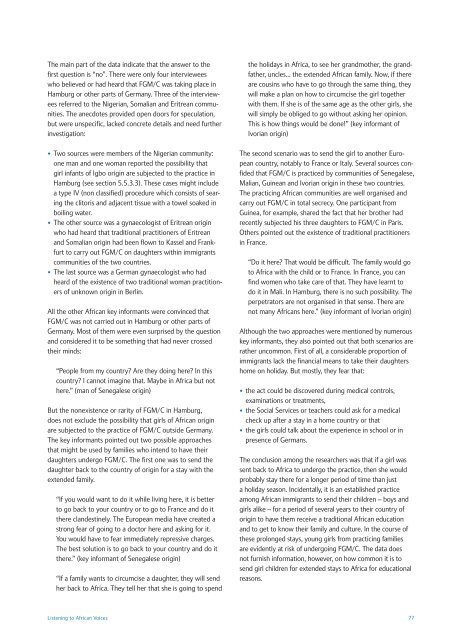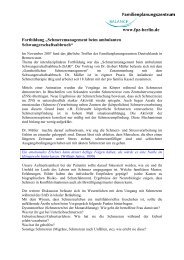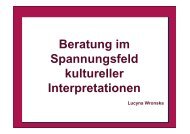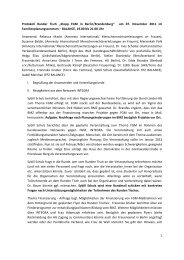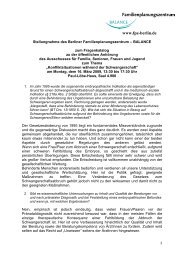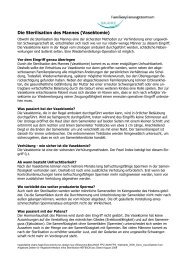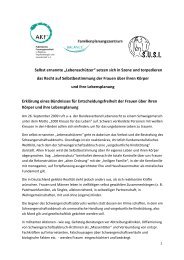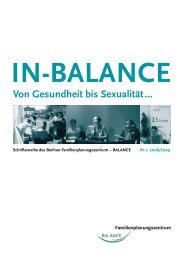Listening to African Voices - FPZ
Listening to African Voices - FPZ
Listening to African Voices - FPZ
You also want an ePaper? Increase the reach of your titles
YUMPU automatically turns print PDFs into web optimized ePapers that Google loves.
The main part of the data indicate that the answer <strong>to</strong> thefirst question is “no”. There were only four intervieweeswho believed or had heard that FGM/C was taking place inHamburg or other parts of Germany. Three of the intervieweesreferred <strong>to</strong> the Nigerian, Somalian and Eritrean communities.The anecdotes provided open doors for speculation,but were unspecific, lacked concrete details and need furtherinvestigation:• Two sources were members of the Nigerian community:one man and one woman reported the possibility thatgirl infants of Igbo origin are subjected <strong>to</strong> the practice inHamburg (see section 5.5.3.3). These cases might includea type IV (non classified) procedure which consists of searingthe cli<strong>to</strong>ris and adjacent tissue with a <strong>to</strong>wel soaked inboiling water.• The other source was a gynaecologist of Eritrean originwho had heard that traditional practitioners of Eritreanand Somalian origin had been fl own <strong>to</strong> Kassel and Frankfurt<strong>to</strong> carry out FGM/C on daughters within immigrantscommunities of the two countries.• The last source was a German gynaecologist who hadheard of the existence of two traditional woman practitionersof unknown origin in Berlin.All the other <strong>African</strong> key informants were convinced thatFGM/C was not carried out in Hamburg or other parts ofGermany. Most of them were even surprised by the questionand considered it <strong>to</strong> be something that had never crossedtheir minds:“People from my country? Are they doing here? In thiscountry? I cannot imagine that. Maybe in Africa but nothere.” (man of Senegalese origin)But the nonexistence or rarity of FGM/C in Hamburg,does not exclude the possibility that girls of <strong>African</strong> originare subjected <strong>to</strong> the practice of FGM/C outside Germany.The key informants pointed out two possible approachesthat might be used by families who intend <strong>to</strong> have theirdaughters undergo FGM/C. The fi rst one was <strong>to</strong> send thedaughter back <strong>to</strong> the country of origin for a stay with theextended family.“If you would want <strong>to</strong> do it while living here, it is better<strong>to</strong> go back <strong>to</strong> your country or <strong>to</strong> go <strong>to</strong> France and do itthere clandestinely. The European media have created astrong fear of going <strong>to</strong> a doc<strong>to</strong>r here and asking for it.You would have <strong>to</strong> fear immediately repressive charges.The best solution is <strong>to</strong> go back <strong>to</strong> your country and do itthere.” (key informant of Senegalese origin)“If a family wants <strong>to</strong> circumcise a daughter, they will sendher back <strong>to</strong> Africa. They tell her that she is going <strong>to</strong> spendthe holidays in Africa, <strong>to</strong> see her grandmother, the grandfather,uncles… the extended <strong>African</strong> family. Now, if thereare cousins who have <strong>to</strong> go through the same thing, theywill make a plan on how <strong>to</strong> circumcise the girl <strong>to</strong>getherwith them. If she is of the same age as the other girls, shewill simply be obliged <strong>to</strong> go without asking her opinion.This is how things would be done!” (key informant ofIvorian origin)The second scenario was <strong>to</strong> send the girl <strong>to</strong> another Europeancountry, notably <strong>to</strong> France or Italy. Several sources confidedthat FGM/C is practiced by communities of Senegalese,Malian, Guinean and Ivorian origin in these two countries.The practicing <strong>African</strong> communities are well organised andcarry out FGM/C in <strong>to</strong>tal secrecy. One participant fromGuinea, for example, shared the fact that her brother hadrecently subjected his three daughters <strong>to</strong> FGM/C in Paris.Others pointed out the existence of traditional practitionersin France.“Do it here? That would be difficult. The family would go<strong>to</strong> Africa with the child or <strong>to</strong> France. In France, you canfind women who take care of that. They have learnt <strong>to</strong>do it in Mali. In Hamburg, there is no such possibility. Theperpetra<strong>to</strong>rs are not organised in that sense. There arenot many <strong>African</strong>s here.” (key informant of Ivorian origin)Although the two approaches were mentioned by numerouskey informants, they also pointed out that both scenarios arerather uncommon. First of all, a considerable proportion ofimmigrants lack the financial means <strong>to</strong> take their daughtershome on holiday. But mostly, they fear that:• the act could be discovered during medical controls,examinations or treatments,• the Social Services or teachers could ask for a medicalcheck up after a stay in a home country or that• the girls could talk about the experience in school or inpresence of Germans.The conclusion among the researchers was that if a girl wassent back <strong>to</strong> Africa <strong>to</strong> undergo the practice, then she wouldprobably stay there for a longer period of time than justa holiday season. Incidentally, it is an established practiceamong <strong>African</strong> immigrants <strong>to</strong> send their children – boys andgirls alike – for a period of several years <strong>to</strong> their country oforigin <strong>to</strong> have them receive a traditional <strong>African</strong> educationand <strong>to</strong> get <strong>to</strong> know their family and culture. In the course ofthese prolonged stays, young girls from practicing familiesare evidently at risk of undergoing FGM/C. The data doesnot furnish information, however, on how common it is <strong>to</strong>send girl children for extended stays <strong>to</strong> Africa for educationalreasons.<strong>Listening</strong> <strong>to</strong> <strong>African</strong> <strong>Voices</strong> 77


